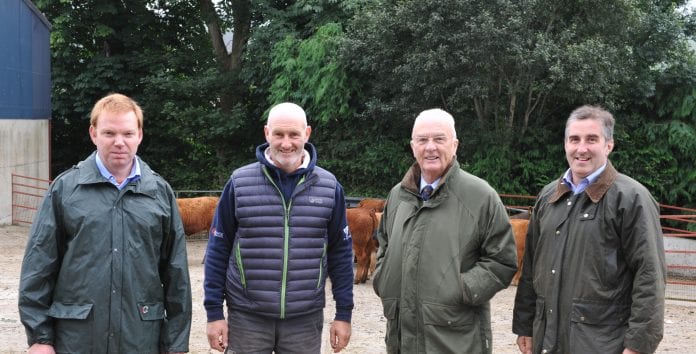As a £10 million initiative to eradicate bovine viral diarrhoea (BVD) from Wales’ national cattle herd gets underway, farmers are urged to take advantage of free testing and veterinary support now or face possible compulsory testing at their own expense in 2020.
BVD is a viral disease that causes immunosuppression and reproductive failure in cattle and is costing the Welsh farming industry £5 million a year through lost productivity.
Thanks to funding secured from the 2014-2020 Rural Development Programme for Wales, every beef or dairy farmer is now entitled to free tests to establish if the disease is present in their herd.
Blood sampling, which is done in conjunction with a farm’s routine TB test, started on September 1st.
At an on-farm launch of the initiative, Peredur Hughes, chairman of the Wales Animal Health and Welfare Framework Group, said the three-year initiative presents a once in a lifetime opportunity.
“This is a voluntary programme and I would urge all farmers to take advantage of it because we anticipate that after three years the government will make BVD a notifiable disease and introduce legislation to make testing compulsory. In this situation, farmers would not be able to sell their animals without first testing and the test would not be free,’’ he said.
Mr Hughes emphasised that the aim of the free testing initiative was not to control BVD, but to eradicate it as several European countries had succeeded in achieving.
The programme – Gwaredu BVD – is being managed by Coleg Sir Gâr’s Agriculture Resource Centre in partnership with the Royal Veterinary College.
There are two delivery partners – Menter a Busnes in the north and Iechyd Da in the south; these are responsible for managing the vets who will undertake the testing work.
The screening involves taking blood samples from five animals aged between 9 and 18 months in every youngstock management group.
The programme’s Veterinary Technical lead, Dr Neil Paton, said samples are taken on the first day of the TB test (TT1) and farmers notified of the results on the day of the TB reading.
Farmers will be urged to act on the results. “For farmers whose herds don’t have the disease, there is the opportunity to talk about protecting against future infection and for those that do there is support to eradicate BVD from their herd,’’ said Dr Paton.
This support includes a £500 voucher per farm to identify Persistently Infected (PI) animals.
John Griffiths chaired the sub-group of the Wales Animal and Health and Welfare Framework Group that was tasked with getting the programme in place.
He urged all cattle farmers in Wales to get their herds tested. “We are very excited about what can be achieved through this scheme,’’ he said.
The launch event was jointly organised by Gwaredu BVD and Farming Connect.
For more information go to: https://businesswales.gov.wales/farmingconnect/gwaredu-bvd
CASE STUDY
Powys livestock farmer Richard Tudor has been vaccinating his cattle against BVD since 2000, after testing confirmed the disease in his suckler herd.
Mr Tudor, who runs a herd of 140 suckler cows and 1200 breeding ewes at Llysun, Llanerfyl, also takes ear tissue samples from his youngstock to monitor for PI animals.
This proactive approach has been beneficial to herd fertility and performance, he said.
“In 2000 we were losing young animals for no apparent reason. My sister is a vet and urged me to get the herd tested and that is when we woke up to the fact that we had a problem with BVD,’’ he recalled.
“We took a proactive approach; it was far better to address the problem than bury our heads in the sand.’’
Mr Tudor, who sells cattle as stores and only buys pedigree bulls that are accredited free of BVD, said his buyers had benefitted too. “It is important that cattle survive and do well after sale. Tag and test is our insurance policy, it gives us peace of mind.’’
Datganiad i’r Wasg
Wrth i gynllun gwerth £10 miliwn gael ei weithredu i waredu dolur rhydd feirysol buchol (BVD) o fuches wartheg genedlaethol Cymru, mae ffermwyr yn cael eu hannog i fanteisio ar brofion am ddim a chymorth milfeddygon neu wynebu’r posibilrwydd o orfod talu am brofion gorfodol yn 2020.
Mae BVD yn glefyd feirysol sy’n achosi gwrthimiwnedd a phroblemau atgenhedlu mewn gwartheg ac mae’r diffyg cynhyrchiant yn costio £5 miliwn y flwyddyn i’r diwydiant amaeth yng Nghymru.
Diolch i gyllid a sicrhawyd gan Raglen Datblygu Gwledig Cymru 2014-2020 mae hawl gan bob ffermwr da byw neu laeth i gael profion am ddim i weld a yw’r clefyd yn bresennol yn eu buches.
Dechreuwyd cynnal profion gwaed, ar y cyd â phrawf TB arferol, ar 1 Medi.
Wrth lansio’r cynllun ar fferm Llysun, dywedodd Peredur Hughes, cadeirydd Grŵp Fframwaith Iechyd a Lles Anifeiliaid Cymru, fod y cynllun tair blynedd yn gyfle unigryw.
“Mae hon yn rhaglen am ddim a byddwn yn annog pob ffermwr i fanteisio arni gan ein bod yn rhagweld ymhen tair blynedd bydd y llywodraeth yn gwneud BVD yn glefyd hysbysadwy ac yn cyflwyno deddfwriaeth i wneud profion yn orfodol. Yn y sefyllfa yma, ni fyddai ffermwyr yn gallu gwerthu eu hanifeiliaid heb gynnal profion yn gynta ac ni fyddai’r prawf am ddim,’’ meddai.
Pwysleisiodd Mr Hughes nad rheoli BVD oedd nod y cynllun profion am ddim ond yn hytrach ei waredu fel y mae nifer o wledydd yn Ewrop wedi llwyddo i’w wneud.
Rheolir y rhaglen – Gwaredu BVD – gan Ganolfan Adnoddau Amaeth Coleg Sir Gâr mewn partneriaeth â’r Coleg Milfeddygol Brenhinol.
Mae dau bartner darparu – Menter a Busnes yn y gogledd ac Iechyd Da yn y de; y rhain sydd yn gyfrifol am reoli’r milfeddygon a fydd yn gwneud y gwaith.
Wrth sgrinio cymerir dau sampl gwaed o bum anifail rhwng 9 a 18 mis ym mhob grŵp rheoli stoc ifanc.
Yn ôl Dr Neil Paton, Arweinydd Technegol Milfeddygol y rhaglen, cymerir samplau ar ddiwrnod cyntaf y prawf TB (TT1) a chaiff ffermwyr wybod beth yw’r canlyniadau ar ddiwrnod y darlleniad TB.
Bydd ffermwyr yn cael eu hannog i weithredu ar y canlyniadau. “I ffermwyr gyda buchesi sy’n rhydd o’r clefyd, bydd cyfle i drafod diogelu’r fuches yn erbyn y clefyd yn y dyfodol ac i’r rhai lle mae’r clefyd yn bresennol, mae cymorth ar gael i waredu BVD o’u buches, ’’ meddai Dr Paton.
Mae’r cymorth hwn yn cynnwys taleb o £500 i bob fferm i restru anifeiliaid sy’n cael eu heintio’n barhaus (PI).
John Griffiths oedd cadeirydd is-grŵp o’r Grŵp Fframwaith Iechyd a Lles Anifeiliaid Cymru a gafodd y gwaith o roi’r rhaglen ar waith.
Ceisiodd annog pob ffermwr yng Nghymru i brofi eu hanifeiliaid. “Rydym yn teimlo’n gyffrous iawn ynglŷn â’r hyn y gellir ei gyflawni drwy’r cynllun yma,” meddai.
Trefnwyd y lansiad ar y cyd gan Gwaredu BVD a Cyswllt Ffermio.
Am fwy o wybodaeth ewch i: https://businesswales.gov.wales/farmingconnect/cy/gwaredu-bvd
ASTUDIAETH ACHOS
Mae Richard Tudor, ffermwr bîff a defaid o Bowys wedi bod yn brechu ei wartheg rhag BVD ers 2000, ar ôl i brofion gadarnhau fod y clefyd yn bresennol yn ei fuches sugno.
Mae Mr Tudor, sydd â buches o 140 o fuchod sugno a 1200 o ddefaid bridio yn Fferm Llysun, Llanerfyl, hefyd yn cymryd samplau o feinwe’r glust o’i stoc ifanc i fonitro anifeiliaid PI.
Mae perfformiad a ffrwythlondeb y fuches wedi elwa ar y dull rhagweithiol hwn, meddai.
“Yn 2000 roeddem yn colli anifeiliaid ifanc heb unrhyw reswm amlwg. Mae fy chwaer yn filfeddyg a pherswadiodd fi i gynnal profion ar y fuches. Dyna pryd y sylweddolwyd bod gennym broblem gyda BVD,’’ meddai.
“Aethom ati mewn ffordd ragweithiol; roedd yn llawer gwell mynd i’r afael â’r broblem na chladdu ein pen yn y tywod.’’
Yn ôl Mr Tudor, sy’n gwerthu gwartheg fel gwartheg stôr ac ond yn prynu teirw pedigri sy’n rhydd o BVD, fod ei brynwyr wedi elwa hefyd. “Mae’n bwysig bod gwartheg yn goroesi ac yn perfformio’n dda ar ôl cael eu gwerthu. Tagio a phrofion yw ein polisi yswiriant, mae’n rhoi tawelwch meddwl i ni.’’


Help keep news FREE for our readers
Supporting your local community newspaper/online news outlet is crucial now more than ever. If you believe in independent journalism, then consider making a valuable contribution by making a one-time or monthly donation. We operate in rural areas where providing unbiased news can be challenging. Read More About Supporting The West Wales Chronicle























